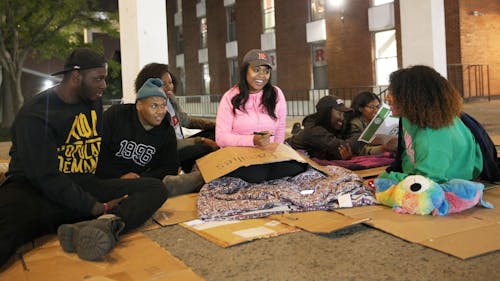Black Student Union sleeps outside for 11 hours

Camped out on the steps of Brower Commons with sleeping bags and pillows, students stepped into the shoes of the homeless for a single night.
From 9 p.m. on Thursday night to 8 a.m. on Friday morning, members of the Rutgers Black Student Union slept outside for 11 hours for the third annual “Homelessness Awareness SleepOut.” Students collected canned goods and clothes in addition to distributing statistics about homelessness in the United States and New Brunswick.
On a particularly frigid October night in 2013, Dionne Higgs participated in the first SleepOut at Rutgers. Looking back at the night, the School of Arts and Sciences junior said she was humbled by the experience.
“(Sleeping outside for) one night was a struggle in its own, so to imagine going through it every day is a completely different experience,” said Higgs, president of the Black Student Union.
Homelessness is a major problem in the United States, where in January of 2014, there were 578,424 people experiencing homelessness on any given night.
<o>But the issue strikes closer to home in New Brunswick. A total of 1,405 people were experiencing homelessness in Middlesex County in 2014, according to Middlesex County's 2014 Point-In-Time Count.</o>
<o>When walking near NJ Transit's New Brunswick Station or down George Street, Higgs said she used to feel more nervous about the homeless population in New Brunswick, but the SleepOut changed her perspective. </o>
“Before that night, I might have been more nervous to get too close to someone (homeless), but it reminds you they are all people," she said.
One of the highlights of the event for Higgs is starting a dialogue with fellow Rutgers students who walk past the Brower Commons with puzzled looks.
“Every year, we always have a whole bunch of people walk by and say ‘Why do you have blankets on the ground?’ and that is actually what we want,” she said.
When people stop to ask questions, Higgs said it opens up a door to explain the homelessness situation in New Brunswick and how homelessness disproportionately affects minority groups, such as black, Latino and LGBT communities.
According to a 2012 report, black families were seven times more likely to stay in homeless shelters than white families in 2010. In 2010, black people made up 12.1 percent of the U.S. family population, but represented 38.8 percent of sheltered people in families.
This statistic speaks to larger issues that lead to homelessness in black communities, such as discrimination, institutionalized racism and privilege, Higgs said. Fighting issues such as poor education systems and institutionalized racism allows black community members to more easily enter higher economic brackets and in turn reduce the homeless population.
"A lot of the times, African Americans grow up in disadvantaged neighborhoods so they get a lack of education. That starts a cycle of not being able to get a better job. There is institutionalized racism that is perpetuating the cycle (of homelessness) as well. When we are fighting for other causes, we are also fighting for an end to homelessness."
Many people fall into homelessness due to this vicious cycle rather than because of drugs or unwisely spending their money, Higgs said.
"A lot of times, the economy is hard or a lot of people in the military fall victim to poverty and homelessness, so it’s really an eye-opening experience," Higgs said.
But the homeless situation in New Jersey is improving. According to the 2014 Annual Homeless Assessment Report to Congress, there was a 34.7 percent decrease in the number of homeless people in New Jersey families from 2007 to 2014, the second largest decrease in the nation.
Jasmine Dennis, a School of Arts and Sciences sophomore, said she anticipates that the SleepOut event will make her feel more grateful and humbled.
"Most of us are privileged enough to lay our head on beds at night, so not many of us think about it," she said.
When Dennis walks around Douglass Campus, she said she often sees a homeless man with a sign who appears to be the same age as a college student.
"I see him all the time. He's basically our age, struggling, and we (Rutgers students) are taking things for granted," said Dennis, the fundraising chair of the Black Student Union. "I already have it good. I should really appreciate what I have."



